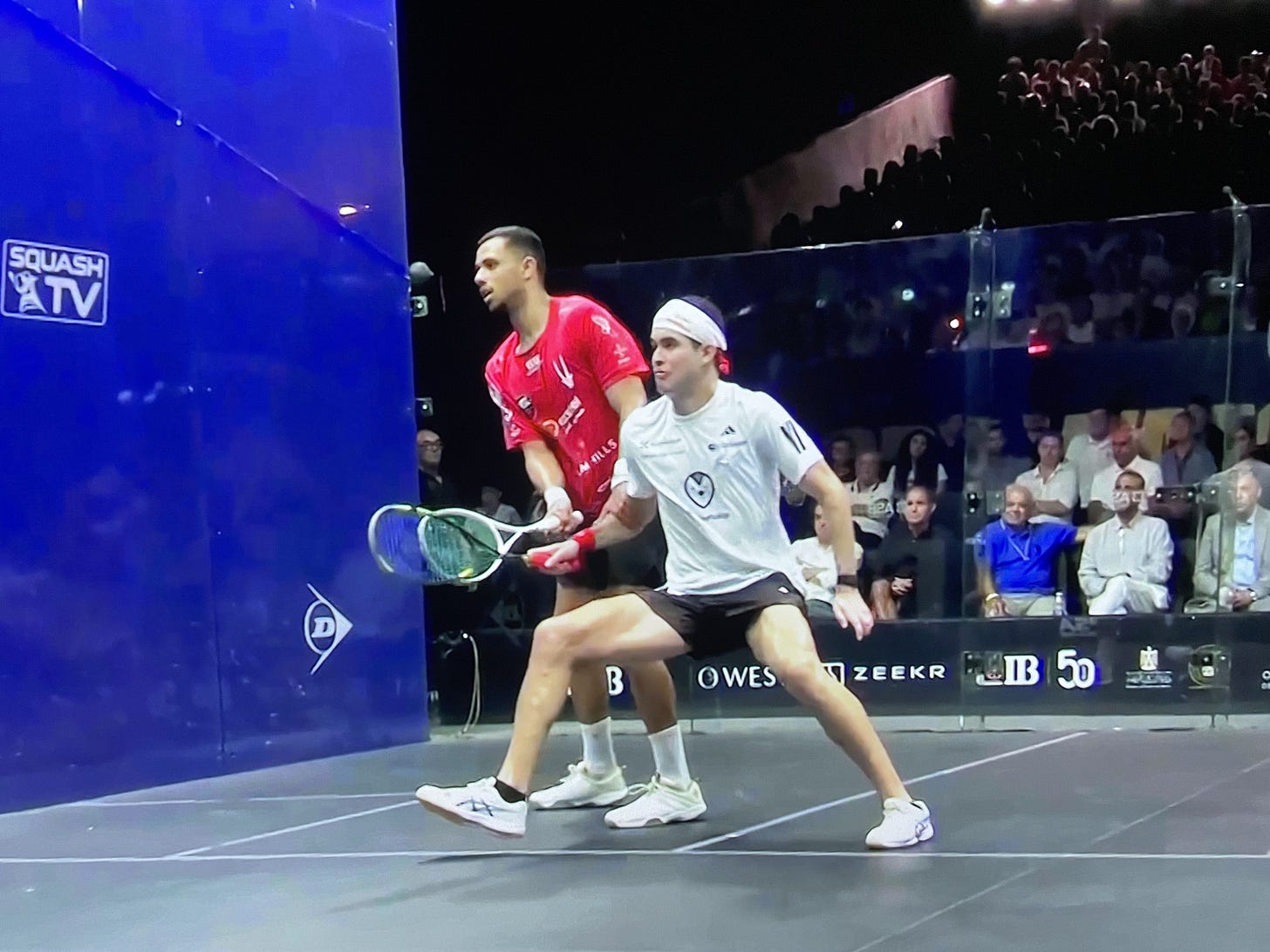Can Mostafa Asal Be Reformed?
Commentators and PSA leadership are trying to hold the world #1’s feet to the fire—but the effort is notable more for its desperation than its success
One of Hosni Mubarak’s more benevolent achievements during his tenure as President of Egypt was his contribution to squash. It was his initiative that gave the country its first international tournament, the Al-Ahram International in 1996, with a glass court majestically set against a backdrop of the pyramids. That inaugural event was won by Jansher Khan, one of the greatest squash players the game has seen. Notoriously media shy—even media-disgruntled—he was also, according to his fiercest rival Jahangir Khan, “a clean squash player.” You can see as much from any number of matches on YouTube, including his final against Ahmed Barada at Al-Ahram. I thought of Jansher Khan while watching the Egyptian Open this past week as Mostafa Asal was crowned champion. Asal, the world #1, is in many ways Khan’s opposite. He loves the camera, and with three suspensions—two in 2023 for dangerous play and unsportsmanlike conduct—has earned a reputation as one of the sport’s dirtiest, most deceitful players.
The offenses began early in the tournament, when Asal blatantly lied during his first match, in round 2, against Sébastien Bonmalais. During a rally at the start of the second game, a piece of material fell off the bottom of Asal's racket. After he won the rally, Bonmalais tried to point out the object to the ref—only Asal had already picked it up and hid it in his towel box. He knew the rule: "If [an] object fell from a player without any contact from the opponent, the opponent wins the rally." Asal played dumb, protesting to the referee: “Where is it? Where is it?” Bonmalais then went to the towel box and retrieved the piece in question; he was awarded the point. What was most baffling about this was that Asal was already up a game, having won the first 11-1, which made his behavior seem borderline pathological.
Still, it was nothing compared to his clash against Aly Abou Eleinen the next day. As usual Asal seemed more interested in creating interference than playing. The dangling leg, the exaggerated swing, a refusal to clear. Out of the match’s 46 points, only 6 were winners, the other 40 decisions: lets, no lets, strokes. Both players spent a fair amount of time getting knocked to the ground, and because glass floors don’t absorb sweat like solid hardwood does, they had to be constantly wiped down with mops, interrupting play. To be fair, Eleinen was guilty of creating traffic as well, but as is becoming increasingly, depressingly clear, the level of physical contact in the men’s game is one that Asal has inspired, and I’d argue it has bled into games he’s not even in. The next match, between Joel Makin and Mohamad Zakaria, likewise resembled not squash but slip-and-slide. Hence, another dozen stoppages. At least the audience had a view of one of the world's seven wonders to enjoy.
“The men’s game is not in a good place,” commentator Lisa Aitken said the next day, during the pre-show for day two of Round 3. After largely ignoring Asal’s most egregious offenses last season, he is getting something of a reckoning from the PSA. Commentators spent much of the tournament discussing his movements and obstructions, referees doled out considerably more strokes against him than in the past, and both the men’s president Saurav Ghosal and four-time world champion Amr Shabana apparently talked to Asal directly about his behavior. No doubt this change in tone was spurred by the New York Times article covering Asal’s conduct that dropped last June—and moreover, by the looming 2028 Olympics, which will feature squash for the first time in the event’s history. “We’re in a lucrative position,” Aitken said. “[This is] our chance to prove we should be there and remain there forever.”
Certainly the women’s game deserves a place in the Olympics. “It’s better than it’s ever been,” commentator Joey Barrington said, a sentiment voiced by many throughout the event, notably Shabana, who said he prefers to watch the women’s tournament. It’s easy to see why, with so many highlights: the five-game, 90-minute thriller between Georgina Kennedy and Nele Gilis, nearly devoid of stoppages; the young Fayrouz Aboelkheir taking down her mentor and eight-time world champion Nour El Sherbini in the quarter-finals, another five-game nail-biter; and most of all, there was the magnificent return of Hania El Hammamy, back from a knee injury, knocking out world #1 Nouran Gohar in the semi-finals and then Amina Orfi in the finals to earn her first ever trophy in a Diamond event. More importantly, the women’s tour has genuine ambassadors in its top ranks, players like El Sherbini and Olivia Weaver who champion their opponents and the sport itself. The game is crowded with clean, respectful players who know that the first rule of any sport is to entertain.
One of the great ambassadors of the men’s game, Ali Farag, retired last May, and his absence at the Egyptian Open was plainly felt. Commentators wistfully invoked him day after day—his civility, his good sportsmanship—concepts that elude Asal. “All kids 4-10 hold [Asal] as a god,” Shabana said, “he has to know every move he does, every video review, they will imitate him from top to bottom. [He has] a responsibility to be a flag bearer, a leader, and a mentor. ” A rehabilitation of the men's game is not only necessary for securing a place in the Olympics, it's necessary for the well-being of the sport in general. While there's growth at the top—PSA tour expansion, prize money increasing, Olympic focus—grassroots squash is being neglected. Courts are disappearing, especially in the U.S. But it's the recreational foundation that ultimately sustains any sport. The grind of the men's game threatens squash's reputation precisely when Olympic exposure could help it most.
Should all that weigh on Asal, specifically? I don’t see why not, especially after his conduct in the final against Diego Elias. I lost count of the number of strokes and no lets referee Roman Svec gave against Asal for blocking Elias from playing. One of Asal’s signature offenses is a subtle one, a very slight extension of his leg to trip his opponent. Ghosal, who was commenting on the game with Barrington, thought one such stroke was harsh. “I genuinely hope that he hasn't done that on purpose..." Wishful thinking, and all credit to Svec for knowing better. Early in game three, after another stroke, Svec told Asal “we are close to a conduct game.” The punishment didn’t come, but perhaps it should have. In game four, Asal briefly grabbed Elias’ arm to prevent him from returning the ball. Because he did this out of the sightline of Svec, no penalty was given, although Barrington took note: “He’s put his arm on his arm.” There was no response from Ghosal; Barrington repeated: “He's put his arm around his arm, hasn't he?” Still nothing from the men’s president of the PSA. I can’t help but imagine that, off screen, Ghosal had his face in his hands. After a week of warnings and urging the world #1 to clean up his act, Asal had learned exactly nothing.
Maybe giving Asal a conduct game would chasten him. That, too, might be wishful thinking, but I can’t help it. I want the best for squash, and at least for now squash is stuck with Asal. Despite everything, he’s an amazing talent. “I would bet anyone, for any amount, if Mostafa does nothing of the antics he’s doing, he’s still going to have the same results,” Shabana said during the pre-show of the quarter finals. “It would not give him an extra title, it will not take away an extra title.” I'd go further - he might win more; he would at least win more points. The irony is that at least once during the final with Elias, when Asal received a conduct stroke, he did so after hitting a clear winner. “We just want him to be responsible and acknowledge that he’s already world #1, [he’s] done the hard part, do the easy stuff now.” But it’s clearly not so easy for Asal to cut out his antics, which speaks to his remarkable, dangerous insecurity. If he can't be responsible, for the sake of the sport, the PSA may need to consider longer suspensions—or maybe they should bar him from playing at the Olympics altogether.




